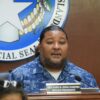House Majority Floor Leader Joseph N. Camacho, R-Saipan, who sponsored the bill, said the governor improperly used his emergency powers when he took over autonomous agencies and government corporations experiencing financial hardship during recent months.
“The Disaster Relief Act does not explicitly authorize the governor to declare a state of disaster emergency over a government agency due to financial crisis or hardship,” said Camacho.
“The Northern Marianas Constitution and commonwealth law provide ample remedies to address government financial crisis or hardship. The purpose of this legislation is to restrict the application of disaster emergencies by governors exercising their emergency powers by clarifying that a disaster emergency does not include government financial crisis or hardship,” he added.
The House held its Friday session on Rota despite criticisms from some members who opposed the idea due to travel costs involved.
Camacho said it’s been a while since the House held its session on Rota.
“During Friday’s session, the House resolved into the committee of the whole and received comments from the Mayor of Rota Joseph Inos, as well as other residents [of the island]. In the audience were residents of Rota, which included students, who wanted to see a House session. It has been some years since a House session has been held on Rota,” he said in an e-mail.
Gov. Benigno R. Fitial declared a state of disaster emergency for the Commonwealth Ports Authority and the Commonwealth Utilities Corp.
CPA’s autonomy was just recently restored.
CUC remains under control of the administration under the governor’s state of disaster emergency declaration.
The governor said this declaration will be lifted once CUC complies with environmental permitting process in connection with the operation of the generators it is renting for $6 million a year from the U.K.-based Aggreko International Power Projects Ltd.
House Bill 16-108, which now heads to the governor, strictly defines “disaster” as natural or manmade case of widespread or severe damage, “except for government financial crisis or hardship.”
These include situations whereby the islands were hit by typhoons, tornadoes, storms, floods, high waters, wind-driven waters, tidal waves, earthquakes, fires, oil spills or other water contamination requiring emergency action to avert danger or damage.
The disaster emergency declaration also covers cases where there’s an epidemic, air contamination, blight, drought, infestation or explosion occurring in any part of the commonwealth.
“A disaster emergency shall be declared by executive order of the governor if the governor finds a disaster has occurred or that occurrence or the threat thereof is imminent; provided that a disaster emergency shall not be declared to avert financial crisis or hardship of government agencies,” states H.B. 16-108.
Press Secretary Charles P. Reyes Jr., in an earlier interview, said the governor “will not support legislation to limit what our…Constitution provides for the chief executive. The governor must be allowed certain constitutional powers to address real crisis situations. I believe just about every governor in the 50 states has certain emergency powers provided for by law.”
He added, “If the governor didn’t have certain constitutional emergency powers, we would not be able to restore power to Saipan using the Aggreko units and CPA’s bond would be declared in default. These powers are necessary.”










